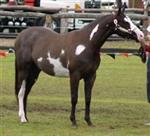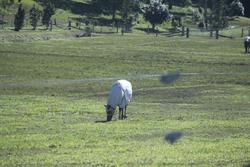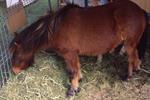 Explore how horses are bred.
Explore how horses are bred.
- Learn about the management and science of equine reproduction
- Enhance your skills for a better career in the equine industry
Course Structure and Content
The course is divided into eight lessons, as follows:
- Breeding Horses
- The Broodmare
- The Stallion
- Breeding Management
- The Pregnant Mare
- Parturition and Foaling
- Care of the New-born Foal
- Infertility in the Mare and Stallion
Course Duration: An average student will require around 100 hours of self paced study. This is commonly spread over 6 to 12 months, but it can be completed faster; or if need be spread out over a longer period.
Working in Horse Breeding

Working in the horse breeding industry can be small or large scale. Generally people will find they get into this industry having been raised in a family linked to horses and breeding or they move into this area within their equine career. Previously working in the horse training industry, often people find they transition naturally into breeding. Working on a breeding farm requires accurate record keeping and management skills. One of the most important roles for the manager is to keep records for the breeding farm. It is critical that the manager knows the status of each mare on the stud and that information is kept in order for use by the registry.
To become a successful horse breeder a formal education is often required. Understanding of the nature and characteristics of horse breeds, science of animal breeding and stud management is also vital. A breeder is required to have sound and adequate knowledge of nutritious feeding, genetics and foaling, safe stabling conditions, equine diseases and first aid. Sound business practices and record keeping is also vital. These attributes are not only for the safety and care of the horses, but also to ensure margins are profitable.
A large amount of financial investment is needed for successful breeding – investment in pastures, stables and outbuildings, transportation, veterinary medicine, feed supplies and employee skills are all vital. This doesn't come cheap.
If you are fortunate enough to have been born into a family of equine professionals then you may find you work in a family business or inherit a reputable and long-established company. For the majority of people, it’s often about proving your skills and worth to find yourself in a position of stud owner or manager.
So how can you get started if you haven’t grown up in the industry? Firstly, you must gain experience as a horse farm employee and learn how to evaluate mares and stallions as producers of foals. Experience is essential. You will also need to have gained high school qualifications as a minimum; qualifications from an agricultural college and/or university (animal science, husbandry, biology and genetics is ideal) will also help. To study equine science and management, you need to own or have access to horses.
The opportunities are limited as what you know you about horses, horse behaviour and physical traits are often knowledge which is developed over time. There are no courses which enable people to go out and breed horses without taking account of their daily care, nutrition and exercise needs and their behaviour and temperament. Additionally to fund a business in horse breeding, significant amounts of money are needed to establish and grow such a business.
So some of the roles required of people who are carrying out horse breeding range from preparation and hands-on work to laboratory work where there is no contact whatsoever with horses! So roles can range from hands-on working with the mating pair carrying out mare or stallion mating preparation procedures. Also your role in breeding may be in to carry out preparation of the breeding area such as organising the phantom mare or artificial vagina (AV).
Once the mare is in foal you know that parturition preparation, being on-site during foaling and raising the newborn foal will all be within the scope of your role. Horses are very good natural delivers of their young – in other words, they generally do not require much human intervention during the foaling process. Being on-site to watch for if something is not right is important however and a responsible breeder or horse owner will ensure the mare is prepared for foaling and safe, clean and warm environment is provided.
Within reproduction and breeding of any animal, there is also a part for the science. Science based work within equine breeding programs may include treating infertility problems (or arranging contraception), carrying out artificial insemination or embryo transfer. Embryo transfer normally requires some laboratory work whilst the fertilisation takes place in the lab and so on. Artificial insemination (AI) practices are a useful skill to develop and so for those people who want to raise a foal and train it for sale, but don’t have a stud male or a stud property, there is increasing demand for AI experts to be able to carry out this task.

On the stud farm there are generally accepted employment levels which typically exist across the industry. While training can help people to learn the required skills for each level, skills are gained through developed practice on the job. Many individuals will start as a stud hand, progressing to senior stud hand and then stud groom. From there, people develop up through the levels of management from stud foreman, stud manager and general manager (depending on the size of the business this last level may or may not exist). These different levels logically relate to different levels of responsibility for example the stud hand or senior stud hand will be responsible for preparing the horses for travel with or without supervision, whereas the stud manager will not be involved in those tasks, instead, he or she will be budgeting for the stud’s production and resource management.
For all of those roles there are always people who are required to teach others so working in education whether it means writing curriculum documents and courses, or carrying out training and assessing others or working, there will always be people looking to learn about the world of horses and breeding.